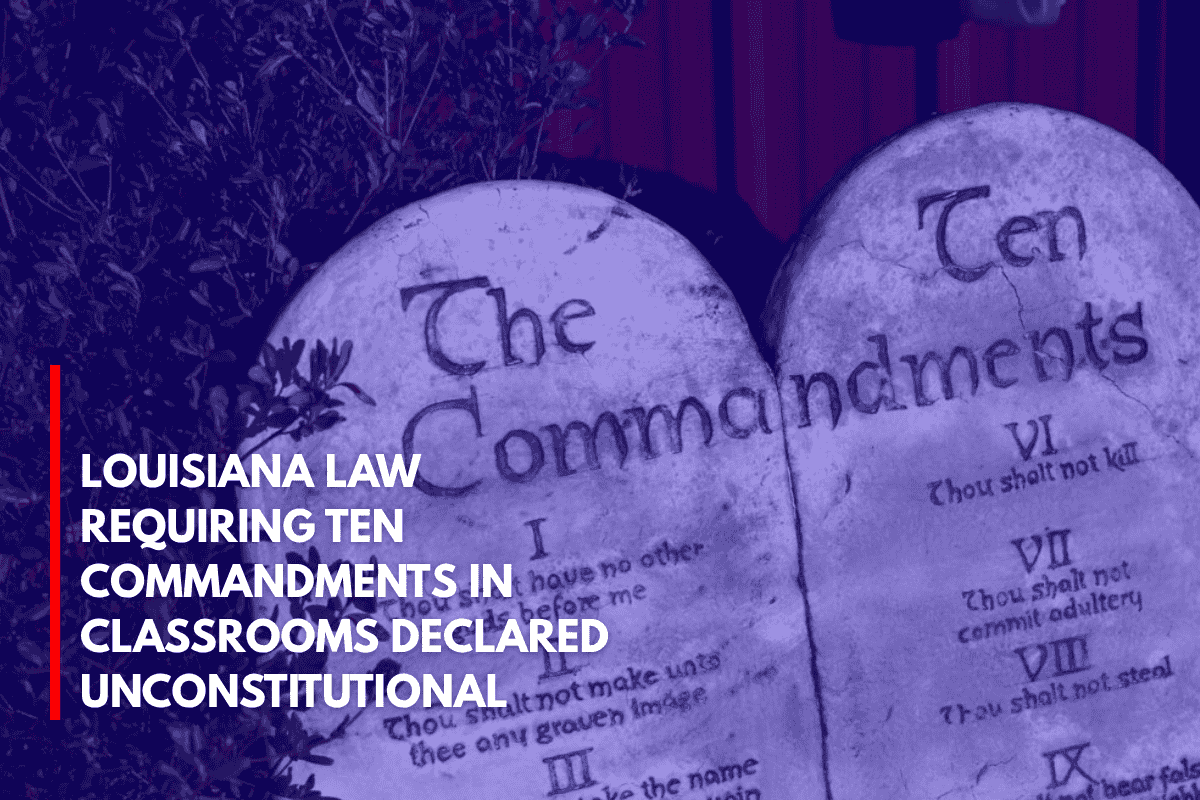A three-judge panel from the 5th U.S. Circuit Court of Appeals ruled on Friday that a Louisiana law requiring the Ten Commandments to be displayed in public school classrooms is unconstitutional, marking a significant victory for civil liberties groups.
The ruling underscores the separation of church and state, stating that the law violates the First Amendment by using public schools to promote religion.
The Case and the Ruling
The law, which was passed by Republican Governor Jeff Landry in June 2024, required schools across the state to display the Ten Commandments in each classroom.
Supporters, including President Donald Trump and other conservatives, argued that the Ten Commandments should be displayed in classrooms because they are historical and foundational to U.S. law.
However, the court found that this mandate would isolate non-Christian students, especially those from different religious backgrounds, and infringed on the constitutional principle that public schools should not endorse a particular religion.
“This is a resounding victory for the separation of church and state and public education,” said Heather L. Weaver, a senior staff attorney with the American Civil Liberties Union (ACLU).
“With today’s ruling, the Fifth Circuit has held Louisiana accountable to a core constitutional promise: Public schools are not Sunday schools, and they must welcome all students, regardless of faith.”
Disagreement Over the Scope of the Ruling
Following the decision, there was some disagreement about whether the ruling applied to every public school district in Louisiana or only to those involved in the lawsuit.
Liz Hayes, a spokesperson for Americans United for Separation of Church and State, argued that the ruling applied statewide and that all public school districts must comply with it.
“All school districts in the state are bound to comply with the U.S. Constitution,” Hayes said. “Thus, all school districts must abide by this decision and should not post the Ten Commandments in their classrooms.”
However, Louisiana Attorney General Liz Murrill disagreed with this interpretation, arguing that the ruling only applied to the five school districts involved in the lawsuit. She also stated her intention to appeal the decision, potentially bringing the case before the U.S. Supreme Court.
Background and Legal Implications
The case stems from a lawsuit filed by parents of Louisiana schoolchildren from diverse religious backgrounds. These parents argued that the law violated the First Amendment, which guarantees both religious liberty and the prohibition of government establishment of religion.
The panel’s ruling also upheld a decision from U.S. District Judge John deGravelles, who previously ruled that the law was unconstitutional and ordered the state not to enforce it.
Governor Jeff Landry expressed his support for the appeal, stating, “The Ten Commandments are the foundation of our laws — serving both an educational and historical purpose in our classrooms.”
Similar Legal Challenges in Other States
This ruling is part of a larger pattern of challenges to similar laws. Recently, a group of families in Arkansas filed a lawsuit against a law in their state requiring Ten Commandments displays in schools, and in Texas, legislation that mirrors Louisiana’s law is awaiting Governor Greg Abbott’s signature.
Precedent from the U.S. Supreme Court
The U.S. Supreme Court has previously weighed in on the issue of religious displays in public spaces. In 1980, the Court ruled that a Kentucky law requiring the display of the Ten Commandments in schools violated the Establishment Clause of the First Amendment, which prohibits the government from establishing an official religion.
In 2005, the Court ruled that displays of the Ten Commandments in two Kentucky courthouses also violated the Constitution, although it upheld a Ten Commandments marker at the Texas State Capitol in Austin, emphasizing that context and purpose matter in these cases.
The Road Ahead
The Louisiana case is expected to continue making its way through the legal system, with a possible appeal to the U.S. Supreme Court. The outcome of this case could set a significant precedent for how religious displays are handled in public schools across the United States.
As the debate continues, the decision highlights the ongoing tension between maintaining religious freedom and ensuring that public institutions remain secular and inclusive for all students, regardless of their beliefs.











Leave a Reply